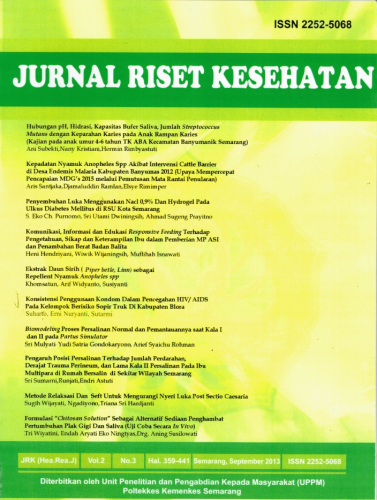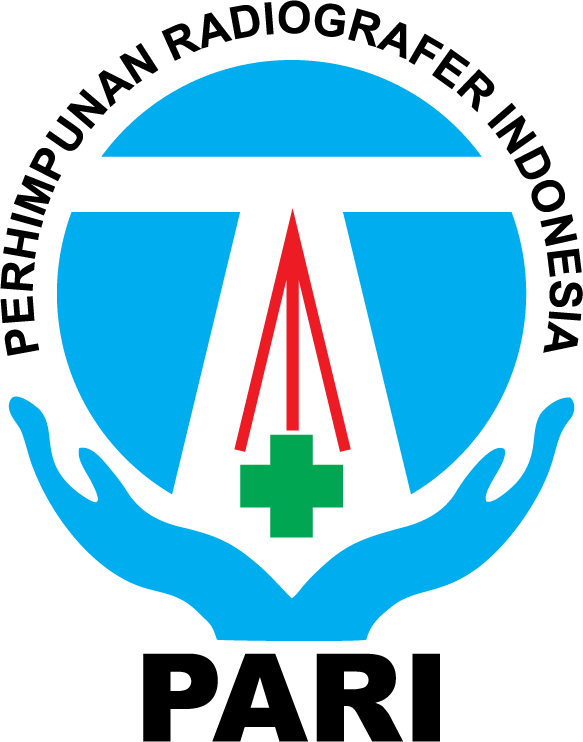RELATIONSHIP FAMILY AND MATERNAL FACTORS WITH INFANT AND YOUNG CHILD FEEDING AGE 6-23 MONTHS IN INDONESIA
Abstract
The Infant and Young Child Feeding (IYCF) programs aim to improve the nutritional and health status, growth and development, and survival of children in Indonesia. Knowing the relationship between maternal factors and family factors in feeding infants and children under 6-23 months. This study used secondary data and analysis of the 2017 Indonesian Demographic and Health Survey (IDHS). The research design used was an analytic observational design using a cross-sectional type to determine the relationship between maternal factors and family factors in feeding infants and toddlers 6-23 months. The sample used is 4869 with a minimum sample of 790 samples. The unit of analysis for this study was all children who were born alive from all live births from mothers who had children under five years of age 6-23 months and children who were born alive and were the last child of a mother who had already had a birth. Data analysis used univariate, bivariate, and multivariate analysis. Multivariate analysis using multivariate logistic regression. The results found that most of the children had the practice of IYCF not according to the recommendations (72.2%). Factors related to IYCF practices are a place of residence, socioeconomic, parity, mother's education, and mother's age, while the most dominant factor related to IYCF practice is socioeconomic. It is necessary to improve education, socialization, and movements toward families, so that the community, especially mothers with children aged 6-23 months.
Keywords
Full Text:
PDFReferences
Ahishakiye, J., Vaandrager, L., Brouwer, I. D., & Koelen, M. (2021). A qualitative, longitudinal exploration of coping strategies and factors facilitating infant and young child feeding practices among mothers in rural Rwanda. BMC Public Health, 21(1), 1–13. https://doi.org/10.1186/s12889-020-10095-8
Aprilla, G. G. (2020). Studi Kasus Inisiasi Menyusui Dini (IMD). Thesis. FKM Universitas Indonesia.
Beyene, M., Worku, A. G., & Wassie, M. M. (2015). Dietary diversity, meal frequency and associated factors among infant and young children in Northwest Ethiopia: A cross-sectional study. BMC Public Health, 15(1), 1–9. https://doi.org/10.1186/s12889-015-2333-x
Biks, G. A., Tariku, A., Wassie, M. M., & Derso, T. (2018). Mother’s Infant and Young Child Feeding (IYCF) knowledge improved the timely initiation of complementary feeding of children aged 6-24 months in the rural population of northwest Ethiopia. BMC Research Notes, 11(1), 1–7. https://doi.org/10.1186/s13104-018-3703-0
BKKBN, BPS, Kemenkes, & AUSAID. (2017). Survei Demografi dan Kesehatan Indonesia 2017. BPS.
Dagne, A. H., Anteneh, K. T., Badi, M. B., Adhanu, H. H., Ahunie, M. A., Tebeje, H. D., & Aynalem, G. L. (2019). Appropriate complementary feeding practice and associated factors among mothers having children aged 6-24 months in Debre Tabor Hospital, North West Ethiopia, 2016. BMC Research Notes, 12(1), 1–6. https://doi.org/10.1186/s13104-019-4259-3
Eshete, T., Kumera, G., Bazezew, Y., Mihretie, A., & Marie, T. (2018). Determinants of inadequate minimum dietary diversity among children aged 6-23months in Ethiopia: Secondary data analysis from Ethiopian Demographic and Health Survey 2016. Agriculture and Food Security, 7(1), 1–8. https://doi.org/10.1186/s40066-018-0219-8
Gautam, K. P., Adhikari, M., Khatri, R. B., & Devkota, M. D. (2016). Determinants of infant and young child feeding practices in Rupandehi, Nepal. BMC Research Notes, 9(1), 1–7. https://doi.org/10.1186/s13104-016-1956-z
Geda, N. R., Feng, C. X., Janzen, B., Lepnurm, R., Henry, C. J., & Whiting, S. J. (2021). Infant and young child feeding practices in Ethiopia: analysis of socioeconomic disparities based on nationally representative data. Archives of Public Health, 79(1), 1–10. https://doi.org/10.1186/s13690-021-00555-x
Kabir, A., & Maitrot, M. R. L. (2017). Factors influencing feeding practices of extreme poor infants and young children in families of working mothers in Dhaka slums: A qualitative study. PLoS ONE, 12(2), 1–15. https://doi.org/10.1371/journal.pone.0172119
Kemenkes RI. (2018). Laporan Nasional Riset Kesehatan dasar 2018. Badan Penelitian dan Pengembangan Kesehatan. Jakarta: Kementerian Kesehatan Republik Indonesia.
Kemenkes RI. (2020). Profil Kesehatan Indonesia Tahun 2019. Jakarta: Kementrian Kesehatan Republik Indonesia.
Khan, G. N., Ariff, S., Khan, U., Habib, A., Umer, M., Suhag, Z., Hussain, I., Bhatti, Z., Ullah, A., Turab, A., Khan, A. A., Garzon, A. C., Khan, M. I., & Soofi, S. (2017). Determinants of infant and young child feeding practices by mothers in two rural districts of Sindh, Pakistan: A cross-sectional survey. International Breastfeeding Journal, 12(1), 1–8. https://doi.org/10.1186/s13006-017-0131-z
Meshram, I. I., Mallikharjun Rao, K., Balakrishna, N., Harikumar, R., Arlappa, N., Sreeramakrishna, K., & Laxmaiah, A. (2019). Infant and young child feeding practices, sociodemographic factors, and their association with nutritional status of children aged <3 years in India: Findings of the National Nutrition Monitoring Bureau survey, 2011-2012. Public Health Nutrition, 22(1), 104–114. https://doi.org/10.1017/S136898001800294X
Nurbaiti, L. (2017). Studi Kasus Kualitatif Pelaksanaan Program Pemberian Makan Bayi dan Anak Lima Puskesmas di Lombok Tengah. Jurnal Kedokteran Unram, 6(4), 1–6.
Subarkah, T., Nursalam, & Rachmawati, P. D. (2016). Pola Pemberian Makan terhadap Peningkatan Status Gizi pada Anak Usia 1-3 tahun. Jurnal INJEC, 1(2), 146–154.
Suryaputri, I. Y., Amaliah, N., Rosha, B. C., & Sari, K. (2018). Pemberian Makanan dengan Frekuensi Sesuai dan Beragam Merupakan Salah Satu Kunci Status Gizi Normal pada Baduta yang Memiliki Riwayat BBLR di Kota Bogor (Studi Kualitatif di Kecamatan Bogor Tengah). Media Penelitian Dan Pengembangan Kesehatan, 28(3), 191–200. https://doi.org/10.22435/mpk.v28i3.233
Tariq, J., Sajjad, A., Zakar, R., Zakar, M. Z., & Fisscher, F. (2018). Faktor yang Berhubungan dengan Kekurangan Gizi pada Anak di Bawah Usia Dua Tahun: Analisis Data Sekunder Berdasarkan Survei Demografi dan Kesehatan Pakistan 2012–2013. Nutrisi, 10(678), 1–20.
Wahyuningksih, E., & Handayani, S. (2015). Pengaruh Pelatihan Pemberian Makan pada Bayi dan Anak terhadap Pengetahuan Kader di Wilayah Puskesmas Klaten Tengah Kabupaten Klaten. Motorik, 10(21), 55–64.
WHO, USAID, & UNICEF. (2010). Indicators for assessing infant and young child feeding practices Part 2 MeasureMent.
Wijayanti, H. N., & Fauziah, A. (2019). The Impact of Pmba Training for Posyandu Cadres on Improving the Nutritional Status of Stunting Children. Jurnal Gizi dan Kesehatan, 11(25), 1–9
DOI: https://doi.org/10.31983/jrk.v11i1.8439
Article Metrics
Refbacks
- There are currently no refbacks.
Copyright (c) 2022 Jurnal Riset Kesehatan




















































